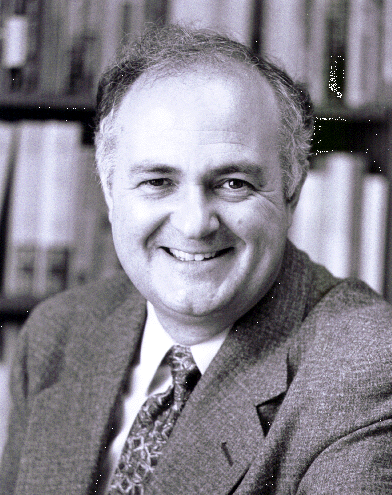|
|
Technology Fellows Program LaunchedComputer-savvy students to collaborate with faculty, electronic resource experts
By Phil Sneiderman
|

Faculty members at Hopkins may be experts in their academic fields, but that doesn't guarantee they're wizards with the latest Internet software. Professors who want to enhance their courses with advanced digital technology may need help, and a new university-wide program promises to provide it.
Hopkins has launched a Technology Fellows Program that will team computer-savvy students with experienced faculty members and electronic resource experts. The goal is to expand existing courses and create new ones by using cutting-edge educational tools, including interactive World Wide Web pages and online discussion groups.
"We're trying to go beyond what is typically available in the classroom," said Candice Dalrymple, who chairs the university's Subcommittee on Electronic and Distance Education, SEDE, which developed the program. "This might be a perfect opportunity for faculty members and students to get involved in a sustained effort that uses the latest digital technologies to enhance the learning process here."
 |
| Provost Steven Knapp |
Undergraduates and graduate students who are accepted in the program during the 1998-99 academic year will earn $1,500 to $5,550, depending on the complexity of the project. Funding has been provided by the office of Provost Steven Knapp.
"In recent years, my office has funded a wide variety of experiments in using electronic tools in the service of teaching," Knapp said. "Those tools are undergoing constant change and refinement, and students are often ahead of the rest of us in keeping current with the changes. So when the SEDE group came forward with this proposal, it seemed to me to make perfect sense."
Applications are available on the Web at www.jhu.edu/SEDE. They should be submitted by Thursday, Oct. 2, 1998, to cdalrymple@jhu.edu as Word or WordPerfect attachments to e-mail. Applications must be submitted in one of these two electronic formats to be considered.
The $1,500 stipends will be awarded, for example, to support the posting of Web-based course materials, including digital versions of existing paper documents such as syllabi, lecture notes and readings, in ways that enhance new or existing courses by expanding student and faculty access to course materials.
The $5,500 stipends will be awarded to support more demanding interactive projects. These might include interactive lab exercises, demonstrations, online discussions, simulations, quizzes or exams, or peer evaluation tools. The aim is to permit faculty and students to improve interaction with one another and help students to take a more active role in the learning process.
A SEDE panel, including faculty members and technology experts, will evaluate the proposals and decide who will receive funding. "People will have to tell us why their project is unusual and why it deserves additional resources," said Dalrymple, who is associate dean for external programs in the Whiting School of Engineering. "We want to know why this course would be better if it could exploit some of these digital technologies."
Some proposals might give students access via computer to documents that cannot be obtained easily elsewhere on campus. The review team will give particular attention to projects that can potentially serve a large number of students and to those that can be easily adapted for use in other Hopkins courses. For example, an online discussion group that enhances a history course might serve as a model for similar groups that support English or chemistry courses.
Awards will be announced by e-mail by Oct. 15.
The program was developed after many faculty members asked technology centers at Hopkins to help them add Web pages and other digital innovations to their more traditional course materials. Because of the limited number of technical experts available for such work, SEDE members proposed the use of Hopkins students, many of whom already possess superior computer skills.
In addition to the monetary award, students will learn to use new technological tools to present material in electronic formats. "This experience will allow students to enhance their resumes and credentials when it comes time to look for a job after they obtain their degrees," Dalrymple said.
Here's how the program will work:
Each project will require a faculty member, who serves as the expert on course content; a student to serve as the technology fellow; a curricular issue facing the faculty or the division; and a technology center to serve as a resource.
The technology centers participating in the programs are the Computer Music Department at the Peabody Conservatory of Music, the Digital Knowledge Center at Milton S. Eisenhower Library, the Digital Media Center in the School of Arts and Sciences, the Distance Education Division at the School of Public Health, the Instructional Television Facility in the School of Engineering, the Multimedia Development Center at Homewood Academic Computing, the Office of Medical Informatics at the School of Medicine and the Welch Medical Library, also at the School of Medicine.
Students and faculty members who want to participate in the Technology Fellows Program must contact one of these centers to enlist the cooperation of its staff before submitting an application for funding. Staff members in these centers have agreed to provide advice and instruction regarding course design and the use of electronic tools to enhance teaching and learning. But the primary execution of the project must be completed by the students.
Dalrymple said SEDE hopes to support about 15 projects during the current academic year. Participants will be expected to showcase their results at a symposium in the fall of 1999 and make the enhanced course materials available to students during the 1999-2000 school year.
| GO TO SEPTEMBER 14, 1998 TABLE OF CONTENTS. |
| GO TO THE GAZETTE HOMEPAGE. |